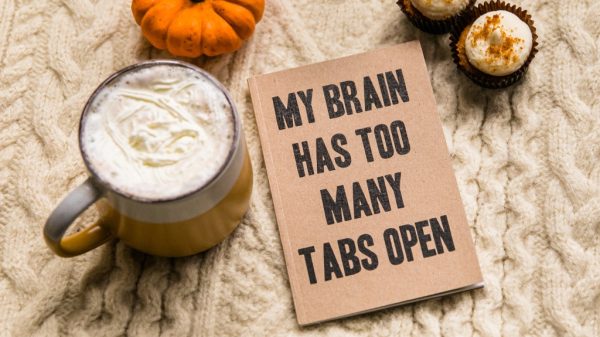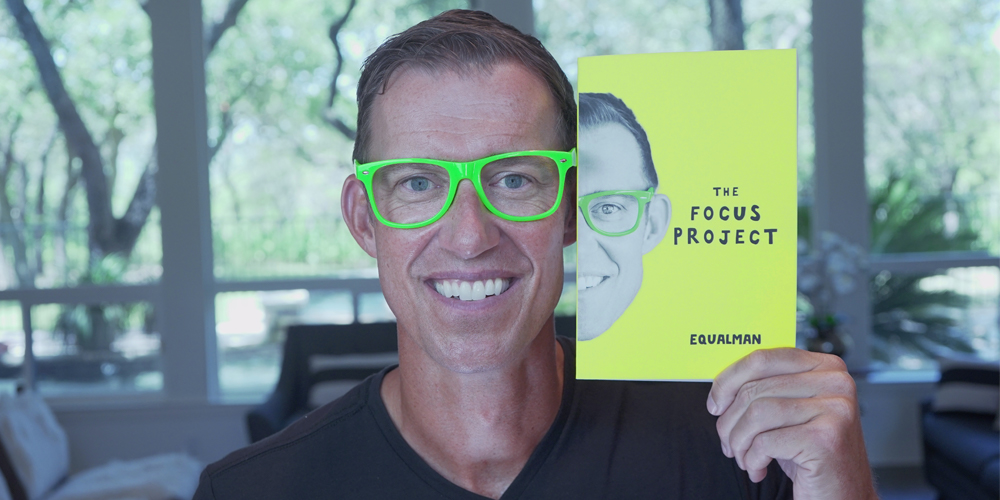In a crazy year of serious health concerns and many shifts in priorities, many of us have been grappling with where to focus our attention. Personally, I am a wife, mother of a toddler and two dogs, a full-time employee, and have a side business with consistent clients. I also was leading a women’s group monthly and have a couple of freelance/contract projects. Upon losing daycare in mid-March, I was drowning.
I felt like nothing was being given full attention and my to-do list was running away without me. I also realize now that all of the above is too much and I NEED to make time for rest and figure out where to focus my time and energy. I also was sad about losing some much needed human connection.
As a Career Coach, I’m constantly preaching the power of networking. While some think that word is icky, I want to share how I met Erik Qualman in a pretty cool networking way. He was a keynote speaker at a conference I attended in 2019. He had an interactive way with the audience where he asked you to email him the one word you wanted to be remembered for.
I wrote compassion (if you were curious). He ended up writing back later and we were able to coordinate a coffee meet up since we both live in Austin. Erik hires many of the students I work with as interns and this was a great opportunity for me to ask about his interview process, what skills he looks for in students, and any other nuggets of insight that could help me coach them better.
In the meantime, he’s been a very kind and generous person to answer my entrepreneurial questions. I’ve also enjoyed his podcast, Super U. It’s full of great insights about finding and living your super powers from a variety of people and backgrounds.
When I saw that Erik’s new book, The Focus Project, launched (a bit early than he had planned), I had to order it. I am currently working through it and emphatically believe this will help many people with solid advice and immediate and long-term action ideas.
The book also covers lots of food for thought on how you are living your life and where you may want to consider adjustments. Erik has also been kind enough to answer some of my questions while I’m working through the book. I truly hope these inspire you to check it out and work on your own priorities of focus.
1. In your own experiment, you took a month to focus on each of these categories in this order: Growth, Time Management, Family + Friends, Health, Relationships, Learning, Creativity, Empathy, Mindfulness, Giving, Gratitude, Your Story and Life. At the end of year after reflection, which one (or more) surprised you the most by focusing on that area? Did it have positive ripple effects to other areas or maybe seemed easier than you originally thought? Would you change the order after going through it?
The first month surprised me the most. I’d attempted to do the project 5 times over the course of a year, so I knew how difficult that first month could be. However, once it clicked I couldn’t believe the results! The focus was on growing our revenue so that I could afford to take the time to test the rest of the project for 11 more months. Just by focusing all of my and the team’s efforts around keynote speaking, we not only had a record sales month, but we almost made a year’s worth of revenue in that one month, leading us to our most successful year. In terms of order, I wouldn’t change the order, but a lot of thinking went into the order before I began.
2. Focus in 2020 is great because it is a metaphor for perfect vision. Do you think there’s any hindsight for individuals that would be important to consider as to why maybe they are feeling so unfocused right now (values they hold to be true, work hard/play hard messaging, etc.)?
Our inability to focus on what matters most is silently killing us inside. This silent killer is similar to the fable of the frog in the pot. Recall that the frog happily sits in a pot of water, unaware of the slowly rising temperature. The premise is that if a frog is dropped into boiling water, it will immediately sense the danger and jump out. But if the water is at room temperature and slowly brought to a boil, the frog will not perceive the danger until it is too late.
Our goal is to ensure that we don’t end up like the frog. Our goal is to leap out of the boiling water—immediately—and never look back.
How many times do we find ourselves thinking: “Oh, tomorrow I’ll start my exercise program, tomorrow I’ll start spending more time with my kids, tomorrow I’ll start writing my screenplay, tomorrow I’ll start my fashion company, tomorrow I’ll start spending less and saving more, tomorrow I’ll ask for a raise, tomorrow I’ll look for a new job, tomorrow I will finish that report, tomorrow will be better.” This is the slow boil! We are in danger of wasting our most precious commodity—our individual lives.
3. Can you share your philosophy/how you balance social media so that you’re able to make the most of it in a positive way versus it being a total time suck?
The key in digital leadership is always a balance between having digital tools work for you rather than you working for the tools. These digital tools should not replace face-to-face experiences but are designed to augment it when time and distance are an issue.
Essentially you need to strike a balance. In order for me, and many other digital leaders, to strike a balance we set time limits on the amount of responses on social media we will tackle personally.
We now have a method, a method we named cowboy scheduling: A calendar with wide-open spaces and fences. I still can’t ride a horse to save my life, but I can now schedule like Annie Oakley or John Wayne.
This week give it a try — try scheduling like a cowgirl or cowboy by fencing off specific times for certain activities and leaving wide open spaces for creativity, relaxation, and deep thinking (or in this case allotting yourself a set amount of time for social media).
4. If you could change one small thing in your community/neighborhood, what would it be? (Think about examples of small changes we can make for positive impact.)
It would be wonderful if your closest 52 neighbors each wrote one nice note per week to a different neighbor each week. This would be a small change with a tremendous impact.
5. You share lots of additional books that inspired The Focus Project. Do you have recommendations for people that may read all the things but have a harder time taking action?
One reason I started writing The Focus Project is that, in some strange way, it will serve as an antidote for my book, Socialnomics ®. It is an antivenom to the poisonous habits technology can manifest in us. For the purposes of this book, I’m most interested in BJ Fogg’s research and philosophy about developing powerful habits via small steps. Fogg, a Stanford psychologist and researcher, specializes in captology – a captologist studies the effect of computers and mobile devices on human behavior. Fogg first appeared on my radar when I was writing Socialnomics. Fogg’s work was relevant to Socialnomics because many of us using social media are unknowing participants in the world’s largest social science experiment—one being controlled by the data scientists at Instagram, YouTube, Weibo, Facebook, TikTok, Twitter, and others.
Fogg argues that we mistakenly try to will our way to habits around activities we don’t enjoy. For example, we get up early and drag ourselves to the gym to ride a stationary bike for an hour. Eventually, since we don’t like it, we stop doing it. We don’t develop the habit. Fogg believes this mistake is more detrimental to a major change in our lives than doing nothing at all. Instead, Fogg explains that we need to start with small adjustments that lead to little victories and to celebrate these victories.
Fogg’s formula involves a trigger. An example of a trigger might be doing 25 sit-ups every time you wash your hands. Washing hands = sit-ups. We normally associate triggers with a negative cause-and-effect relationship. In Fogg’s formula, however, instead of negative triggers, the triggers are positive influences.
Here’s the simple formula for identifying triggers.
“After I Establish Habit, I will New Habit.”
Fogg’s best-known example of this formula is:
“After I Brush my teeth, I will Floss One Tooth.”
This sounds preposterous—who would floss just one tooth? This is exactly the point! Once you put into motion the flossing of one tooth you might say, “What the heck, why not floss a couple more?”
Neil Armstrong got it right, small steps lead to giant leaps.
FAQ about the book from the Author
How would you describe your book in 2-3 sentences?
The Focus Project teaches us how to focus on what matters most in this digitally unfocused world. In some ways it’s an anti-venom to my first book, Socialnomics.
Explaining The Focus Project in 7 seconds: The Happiness Project (by Gretchen Rubin) and Essentialism (by Greg McKeown) have a baby with Amazon Alexa as the surrogate mother.
What distinguishes your book from others before it?
The Focus Project is unique in that each chapter is designed to provide a new area of focus, so the reader does not necessarily need to read the book chronologically. Each chapter is a month of the project. The blend of case studies and anecdotal elements are relatable and designed to help people at any stage in life, both personally and professionally. One main differentiating factor is Erik’s personal first-hand studies and stories. Due to his speaking schedule (55 countries and 35 million reached) and exposure to some of the world’s top thought leaders the book is less “dry” than most business books.
What problem will this book solve for the reader or what significant benefit will the reader get from the book? Why should the reader spend their valuable time reading this book? Why is the message of this book important?
The Focus Project doesn’t offer an overnight cure, but with time, patience, and persistence, significant progress is possible. This book will help to provide answers and solutions to the challenges of:
- Focusing on what matters most.
- Focusing in an increasingly unfocused world.
- Becoming a focus ninja.
The following is a guide to help lead us on our individual paths of personal development—pursuing less in order to achieve more: More happiness, more love, a more fulfilled life. We will realize that leading an overly busy life is a choice, but it’s not a wise one. Despite the perceptions of many, being over scheduled isn’t something to be proud of—it’s something to avoid at all costs. Instead, we should choose to focus on what matters most. This choice determines our success, happiness, and fulfillment.
The Focus Project solves the problem of prioritizing what matters most and confronting digital distractions to get the most out of life. Using both clinical science and street science this book helps the reader to better focus which, in turn, helps us reduce our stress and achieve our goals.
Some main ideas in the book:
- What items if I focus on them will bring me fulfillment? What’s preventing me from focusing on them? How can I focus on them first?
- The power of saying no and how to say it.
- Making a Not-to-Do List is more important than your To-Do-List
You can learn more about Erik and the book here.
Erin Wike is a Career Coach & Lecturer at The University of Texas at Austin and owner of Cafe Con Resume. Erin is fueled by dark roast coffee with cream AND sugar, her loving husband, daughter, and two rescue dogs. She is the Co-Founder of Small Business Friends ATX to help fellow entrepreneurs + hosts events for people to live a Life of Yes with Mac & Cheese Productions.

















































